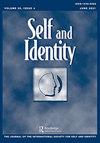Adaptive self-concept: Identifying the basic dimensions of self-beliefs
IF 2.1
4区 心理学
Q3 PSYCHOLOGY, SOCIAL
引用次数: 11
Abstract
ABSTRACT We present three studies aimed to identify the adaptive properties of self-concept and to develop a brief questionnaire to measure them. In the first study, we identified five basic facets of adaptive self-concept (ASC): clarity, non-ruminative self-awareness, self-distance, openness to self-relevant information, and modifiability of the self-concept. The second study confirmed the five-factor structure of the ASC. In the third study, we tested relationships between ASC’s facets and hedonic, eudaimonic, and social well-being, self-regulation and emotional regulation. We also tested the dependence of the ASC on personality traits. The results showed that ASC features are strongly related to optimal functioning in its various manifestations. ASC’s facets are also moderately dependent on personality traits.适应性自我概念:确定自我信念的基本维度
本文介绍了三项研究,旨在确定自我概念的适应性特性,并开发了一份简短的问卷来测量它们。在第一项研究中,我们确定了适应性自我概念(ASC)的五个基本方面:清晰性、非反刍性自我意识、自我距离、对自我相关信息的开放性和自我概念的可修改性。第二项研究证实了ASC的五因子结构。在第三项研究中,我们测试了ASC方面与享乐、幸福、社会福利、自我调节和情绪调节之间的关系。我们还测试了ASC对人格特质的依赖性。结果表明,ASC的各种表现形式与最佳功能密切相关。ASC的方面也适度依赖于人格特征。
本文章由计算机程序翻译,如有差异,请以英文原文为准。
求助全文
约1分钟内获得全文
求助全文
来源期刊

Self and Identity
PSYCHOLOGY, SOCIAL-
CiteScore
5.10
自引率
5.00%
发文量
26
期刊介绍:
Work on self and identity has a special place in the study of human nature, as self-concerns are arguably at the center of individuals" striving for well-being and for making sense of one"s life. Life goals develop and are influenced by one"s view of what one is like, the way one would ideally like to be (or would like to avoid being), as well as one"s perceptions of what is feasible. Furthermore, conceptions of self and the world affect how one"s progress towards these goals is monitored, evaluated, redirected, re-evaluated, and pursued again. Thus, the “self” as a construct has far-reaching implications for behavior, self-esteem, motivation, experience of emotions and the world more broadly, and hence for interpersonal relationships, society, and culture.
 求助内容:
求助内容: 应助结果提醒方式:
应助结果提醒方式:


